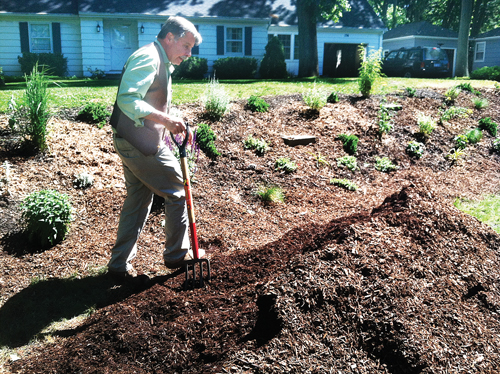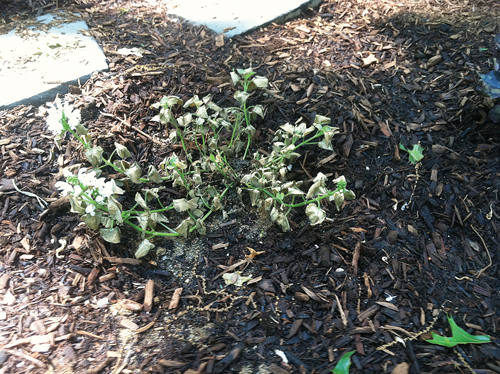Real Estate: Getting a mulch delivery? First, give it a smell

The Rev. Sean Murray is not only a man of God, he says he’s also “a bit of a gardening maniac,” who’s been at it for some 20 years.
And so, he laments, he should have known something was amiss on a recent Friday morning when six yards of mulch delivered to his house gave off an unusual, acidic smell, something like vinegar.
“I just figured I was in a new place,” said the Rev. Murray, who moved to Riverhead earlier this year from Syosset to become the spiritual leader at First Congregational Church on East Main Street.
But it wasn’t the North Fork or its trees that created the smell, which was unfamiliar and unlike the mulch he’d been used to spreading around his property over the years in Nassau County.
The delivery to the Rev. Murray’s Riverhead house was what’s known as in the industry as “hot mulch.” Referred to on a Cornell University Department of Horticulture website entry as “sour mulch,” the terms refer to mulch that hasn’t been prepared or stored properly, causing excess liquids or gases to form.
And, university staffers warn on gardening.cornell.edu, it “can kill your plants if you’re not careful.”
“Once you’ve spread sour mulch on your plants, there isn’t much you can do,” reads a Cornell website entry on sour mulch. “[The plants] may recover on their own after being set back some. But removing the mulch seldom helps once the damage is done.”

“This is the first time I’d seen something like this,” the Rev. Murray said during a recent tour of his property. “It kills me, man.”
Nancy Orientale, vice president of Sound Side Landscape in Southold, said mulch that isn’t fresh would quickly be identified as such by most professionals.
“I would say that it’s probably something limited to a homeowner experience,” she said. “Mulch catches fire all the time due to high nitrogen levels in it. It’s supposed to sit for a time and get turned. It’s like a dog urinating on a lawn and it turns brown.”
And it’s not as if the mulch has no hope for a future of sprucing up a garden, Ms. Orientale added.
“It’s really just mulch that hasn’t completed the process of breaking down,” she said. “Where all it needs is good old-fashioned oxygen that would balance out all those elements. We’re very attuned to the mulch, and if it doesn’t pass the smell test, we wouldn’t lay it down.”
Ken Kraus is the owner of Island Bio Greens, a Riverhead company that offers organic soil enrichment services. Before he got into the business he owned a hotel and restaurant.
And he, too, has encountered hot mulch.
“I’ve had personal experiences where I’ve also burned plants,” he said. “The mulch should certainly smell right and earthy,” and not biting or pungent.
“You put down mulch more for the aesthetics and color,” he said. “So knowing that, you want to apply it judiciously and carefully and not have it sit on plants. Even if you plan on watering these plants it’s always good to have a bit of room for some water to penetrate.”
Last week, the Rev. Murray inventoried his losses. The mulch burned a sage, two garuas, two creeping phlox plants and several annuals, including begonias and petunias, with some plants still hanging on.
“In spite of what seems a bit like a prolonged death march, I’m trying to remain optimistic,” he said.
After noticing his plants were being fried the day he was laying down his mulch, he scurried to the Web and found the Cornell informational page. He followed directions and pulled the mulch back from dozens of plants. Then he watered to wash away the acidity.
He called the vendor about the bad mulch, but never heard back after leaving messages. The reverend said he’s not looking to hurt anyone’s business, but contacted the paper so he could help his neighbors avoid batches of bad mulch before it’s too late.
“Most of the people I’ve spoken with were completely unfamiliar with the problem,” he said. “I want to help others avoid such heartbreak.”
Should other home gardeners end up in the same boat, standing in their gardens at a loss for what to do, the Rev. Murray offers this godly advice:
“In order to turn things around in our lives, we repent. In order to turn things around in our gardens, we replant.”






